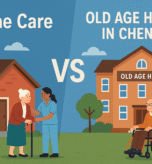
As we age, we may face new challenges that can make daily tasks and routines more difficult. This is especially true for elderly patients who may need additional care and support to maintain their quality of life. While some may choose to move to a nursing home or assisted living facility, others may prefer to stay in their own homes. In-home care is an excellent option for elderly patients who want to maintain their independence while receiving the care they need. Here are some benefits of in-home care for elderly patients:
1. Personalized Care
In-home care allows for personalized care plans tailored to the specific needs and preferences of each patient. Caregivers can work with patients to develop a plan that addresses their unique needs, including help with bathing, grooming, and medication management. This level of personalization ensures that patients receive the care they need, when they need it, and in a manner that is comfortable and familiar to them.
2. Enhanced Comfort
Elderly patients who receive in-home care are able to stay in their own homes, surrounded by the people and things they love. This can provide a great deal of comfort and security for patients, especially those who may be struggling with physical or cognitive challenges. In-home care also eliminates the need for patients to adjust to a new living environment, which can be stressful and overwhelming.
3. Cost-Effective
In-home care can be a more cost-effective alternative to nursing homes or assisted living facilities. The cost of in-home care can vary depending on the level of care required, but it is often less expensive than the cost of a nursing home or assisted living facility. In addition, in-home care allows patients to remain in their own homes, eliminating the need to pay for room and board at a care facility.
4. Improved Health Outcomes
In-home care can lead to improved health outcomes for elderly patients. Patients who receive in-home care are able to maintain a more independent lifestyle, which can help to prevent falls and other injuries. In addition, in-home caregivers can assist with medication management and help patients to follow a healthy diet and exercise routine, which can lead to better health outcomes over time.
5. Increased Socialization
Elderly patients who receive in-home care are able to maintain social connections with friends and family members. This can be especially important for patients who may be at risk of social isolation, which can lead to depression and other mental health challenges. In-home caregivers can provide companionship and help patients to participate in social activities that they enjoy.
6. Peace of Mind for Family Members
In-home care can provide peace of mind for family members who may be worried about the well-being of their elderly loved ones. Family members can rest assured that their loved ones are receiving the care they need, and they can stay informed about their care through regular updates from in-home caregivers.
In conclusion, in-home care can provide a range of benefits for elderly patients who want to maintain their independence while receiving the care they need. From personalized care plans to increased socialization, in-home care can help to improve the quality of life for elderly patients and their families. If you or a loved one is in need of care, consider in-home care as a viable and cost-effective option.





